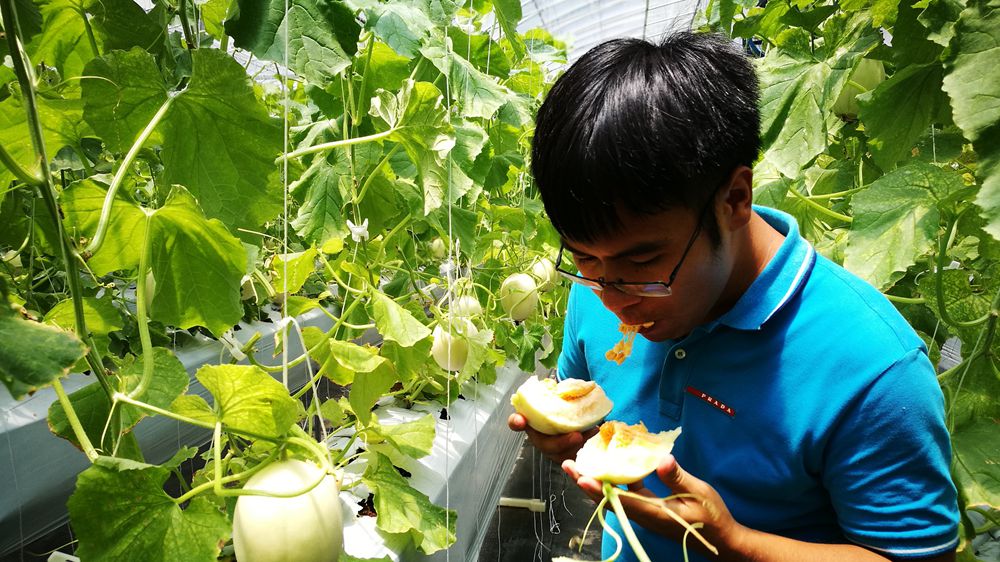
Wu Qingtong, a second-generation rich, runs her own tailor's shop in Taiyuan City, north China's Shanxi Province, February 25, 2018. /CFP
Wu Qingtong, a second-generation rich, runs her own tailor's shop in Taiyuan City, north China's Shanxi Province, February 25, 2018. /CFP
The reform and opening-up, launched by China in 1978, has encouraged millions of migrant workers to leave their poverty-stricken rural homes and seek their fortune in the city.
In some cases, simply earning a decent wage wasn't enough, and from their new urban bases, once-poor farmers launched their businesses, with a handful becoming highly successful private entrepreneurs.
It's estimated that over 80 percent of China's private companies are family-run affairs.
Now, however, many of these business owners are facing a succession problem. As they approach retirement age, they are asking themselves whether their children have the intelligence and skills to carry on the family business, as well, most tellingly, the hard-working attitude and business acumen that were the secret to their success.
If certain media reports are to be believed, the answer is a resounding "no."The children of the nouveau rich – or fu er dai – often find themselves cast in a very negative light as typical rich kids with more money than sense.
These "second-generation rich" are portrayed as living the high life, driving expensive cars, wearing brands, snapping up the latest gadgets, and even - in one notorious case - lavishing two gold Apple watches on the family dog. In short, they are more interested in spending money, than making it.
This doesn't bode well for the future of their family business. There's a well-known Chinese saying, "fu bu guo san dai." Roughly translated, it means "rarely do three generations make good." In other words, it's more common for a family business to fail under those who inherit it, rather than for the success to continue.

Lyu Kan, a second-generation rich, tastes the melon at a vegetable farm operated by him in Lishui City, east China's Zhejiang Province, June 18, 2018. /CFP
Lyu Kan, a second-generation rich, tastes the melon at a vegetable farm operated by him in Lishui City, east China's Zhejiang Province, June 18, 2018. /CFP
A highly cynical video currently accessible on YouTube, titled "Second Generation Rich RUIN China's Image," paints a very dark picture of the fuerdai.
It highlights spoiled children who, while purportedly studying overseas, are living a life of luxury, giving the impression that they have money to burn. There is even the suggestion that the real reason their parents send them overseas is to launder their wealth.
Such sensationalist reporting is at odds with the inspiring rags-to-riches stories of parents who made huge sacrifices to build a better life for their families and, by doing so, contributed to China's economic miracle, and of children who, in the vast majority of cases, are grateful for what life has given them and are determined to continue the family business.
One such example is Yuanyuan and her parents. They came to Beijing from the countryside of southern China 20 years ago. Yuanyuan was very young at the time, but still remembers the hard life her parents lived as migrant workers.
Eventually, though, her father set up his own business, building stands for auto exhibitions. It grew quickly to employing hundreds of full-time workers.
For Yuanyuan and her younger brother, life changed very much for the better. Yet, she has opted against an overly extravagant lifestyle.

Yuanyuan on vacation in Erhai, southwest China's Yunnan Province. / Yuanyuan
Yuanyuan on vacation in Erhai, southwest China's Yunnan Province. / Yuanyuan
Her memories of her parents' hard work and sacrifices have made a deep impression on her. Still, she does enjoy some of the trappings of wealth - driving an expensive car and taking regular vacations - that make her the envy of many of her peers in their 20s. But not to excess.
Yuanyuan is also working for her father's company. On the question of whether she will inherit the family business, she says that for the moment she needs to concentrate on learning how it operates.
This, she acknowledges, will take time. "I'll only consider taking over one day," she said, "if I'm confident I have the ability."
She also appreciates the advantages she has been given in life. Not only does she have no need to worry about providing for herself; she has also had a good education - obtaining a degree in engineering from an elite university in Shanghai - and at work has her father to guide and train her.
She appreciates that her experience is so different from her father, who had only hard work and his wits to rely on in becoming successful.
Yuanyuan hopes that as she becomes more engaged, the family business will continue to prosper and develop.
This, she insists, is not simply for her own benefit, but also for the good of the people working for her. "I'm happiest when the people around me are happy, doing a steady, well-paid job," she said.

